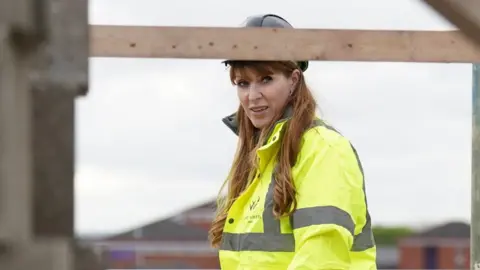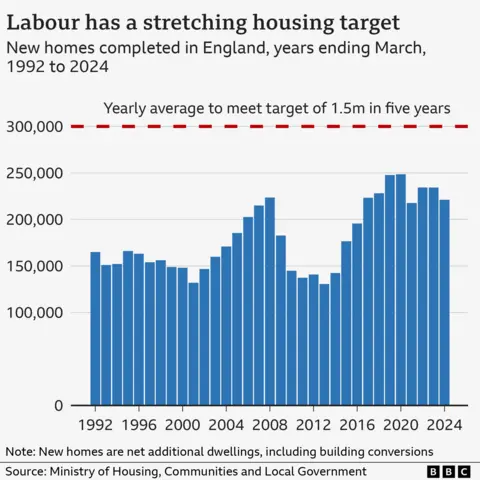ARTICLE AD BOX

 PA Media
PA Media
Developers who leave housing sites unfinished for years could see their land handed over to local councils under new rules aimed at getting new homes built faster.
Under government plans, housebuilders will have to commit to delivery time frames before they get planning permission, and will also have to submit annual reports to councils showing their progress.
The new rules form part of the government's plan to address the housing crisis, with 1.5 million new homes in England by 2029.
The Conservative Party said it supported measures to speed up housebuilding, but accused the government of "adding so many burdens on builders" that its housing targets "already seem like a distant memory".
As well as losing their land, the government said housebuilders who repeatedly fail to hit their targets could also be denied future permissions.
They may also face penalties worth thousands of pounds per unbuilt home, paid directly to local planning authorities.
Deputy Prime Minister Angela Rayner said the government was continuing to back "the builders not the blockers", adding it was "time for developers to roll up their sleeves and play their part".
Rayner, who also serves as housing secretary, said: "We're going even further to get the homes we need. No more sites with planning permission gathering dust for decades while a generation struggle to get on the housing ladder."
A Planning Reform Working Paper setting out the proposals will be published on Sunday.
Housing charity Shelter welcomed the plans.
Alicia Walker, the charity's assistant director of advocacy and activism, said developers "drag their heels" when housebuilding "to keep prices high and make bigger profits".
She accused them of "often dodging their responsibility to build social housing altogether".
"Meanwhile, thousands of families who are bearing the brunt of the housing emergency, homeless in temporary accommodation or crushed by skyrocketing rents, cannot afford to wait."
Ms Walker also said that while building housing faster was important, "the only way to end the housing emergency for good is to get councils and housing associations building social housing as well".


The government says that 1.3 million families are on social housing waiting lists, while a record number - including 160,000 children - are in temporary accommodation. Millions of people also cannot afford to buy their first home.
The government's aim is for 370,000 new homes to be built in England every year to hit its promise of 1.5 million by 2029. To aid this, local authorities are being told to give developers permission to build.
Office for Budget Responsibility (OBR) figures released in March suggested housebuilding would fall short of the 1.5 million target, even with planning reforms previously outlined in the Spring Statement.
The government argued that further reforms not reflected in the OBR forecast would help it reach the number.
Separate OBR figures previously showed housebuilding was set to hit a 40-year high and boost the economy by £6.8bn by 2029.
The government said large housing developments, producing more than 2,000 homes, can take at least 14 years to build, but those with more affordable homes can be built twice as fast.
It said it would therefore test a new requirement for large developments to be mixed tenure - meaning a range of housing options - by default in an effort to build homes, including more affordable homes, quicker.
Shadow housing secretary Kevin Hollinrake claimed that "many hardworking Brits will be shut out of the housing market forever" as "Labour's open door border policy" meant "many of these houses will end up going to migrants".
He added: "In the same week that Angela Rayner has been caught red-handed plotting to raise everyone's taxes, it's clear she doesn't have the interests of working people at heart."

 3 hours ago
2
3 hours ago
2








 English (US) ·
English (US) ·